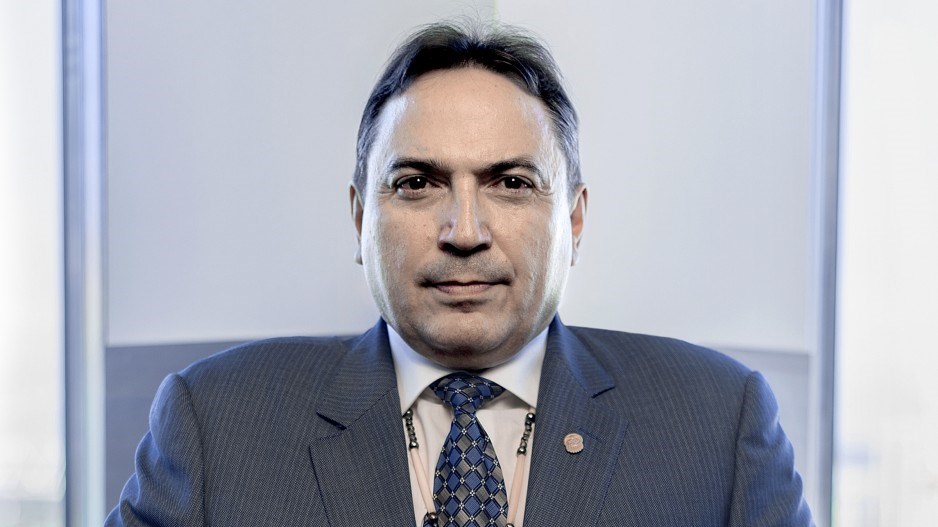This week, First Nations chiefs from across the country will gather in Vancouver to decide who will helm the most influential Indigenous advocacy group in the country.
On July 25, chiefs or proxies from up to 634 bands will vote to elect the national chief of the Assembly of First Nations (AFN) for a three-year term.
Five candidates have spent the last several weeks campaigning for the role, including incumbent national chief Perry Bellegarde.
Bellegarde, who was elected to the position in 2014, said the organization has strengthened its influence during his tenure.
“I think we brought some relevancy back to the AFN,” he said.
His critics on the campaign trail, however, have argued that the assembly has lost sight of First Nations concerns and has focused instead on the priorities of the federal government.
“There’s growing concern about the Trudeau government’s actions, which are pretty unilateral,” said Russell Diabo, a member of the Mohawk Nation and a candidate for national chief. Diabo, a recognized Indigenous policy analyst, added that national engagement on any initiative has been “pretty shallow.”
Miles Richardson, a Haida Nation member and the race’s only candidate from B.C., said the AFN needs to prioritize First Nations voices and concerns.
“Instead of spending all my time talking to the federal government and reacting to the federal and provincial governments, I’d spend most of my effort talking to my own people,” Richardson said.
Bellegarde points out he has taken the federal government to task in defence of First Nations rights and jurisdiction, and said progress has been made under his leadership.
During his first term, Canada officially announced its support for the United Nations Declaration on the Rights of Indigenous Peoples. The AFN secured regular, cabinet-level access for First Nations issues through the creation of the AFN-Canada Working Group; it was also involved in a joint review of the fiscal relationship between First Nations and the Crown.
Since 2015, the government of Prime Minister Justin Trudeau has committed $17 billion over seven years to First Nations priorities, including an unprecedented $8.4 billion over five years announced in 2016, and $5 billion over five years earmarked earlier this year to mend Canada’s relationship with Indigenous peoples.
“That’s one of the major things: getting this Liberal government to invest,” said Bellegarde, who added that while Canada ranks high on the UN’s Human Development Index – 10th in 2016 – First Nations have ranked 63rd or lower, a gap he says can’t be closed without investments in water, housing, health care and education.
“We’re not done yet, because the gap is not going to be closed in one or two or three fiscal years. You need long-term sustainable investments,” he said.
However, Diabo has argued on the campaign trail that billions in federal budget commitments pay lip service to meaningful change, and that the AFN needs to do more to refocus on reconciliation.
“Once that $17 billion is spent, you’ve got to come back to the well,” he said. “Perry Bellegarde’s lost control of the agenda because it’s being driven by the prime minister’s office and his cabinet.”
One of the pillars of Diabo’s campaign platform is to move the AFN to a decentralized leadership structure to better reflect the needs of various First Nations. He has also publicly stated he is against the Trans Mountain pipeline expansion project, and argues the National Inquiry into Missing and Murdered Indigenous Women and Girls has been poorly managed.
Richardson said a more respectful relationship between First Nations and the federal government begins with creating space for communities to define their own identities.
“I think that’s missing right now, and that’s a really important role for the AFN to play,” he explained, adding that First Nations should also have jurisdiction over areas including health authorities and child welfare.
If elected, Richardson would be the second AFN national chief from B.C., preceded by Shawn Atleo, who was elected in 2009. Richardson said the position would allow him to highlight issues in B.C. that are of national significance.
“It would provide an opportunity to bring those issues from the West Coast, from B.C., into the national agenda in a stronger way, in a way that would help all nations across this country,” Richardson said. “And I believe there are many that’s not happening with.”
He said First Nations should be more involved in managing and operating fisheries, and that the AFN should be championing that involvement.
Katherine Whitecloud, a former AFN regional chief for Manitoba, and Sheila North, grand chief of political advocacy organization Manitoba Keewatinowi Okimakanak, are the other candidates for national chief. The election of Whitecloud or North would give the AFN its first female leader. Neither candidate could be reached for an interview by press time.




